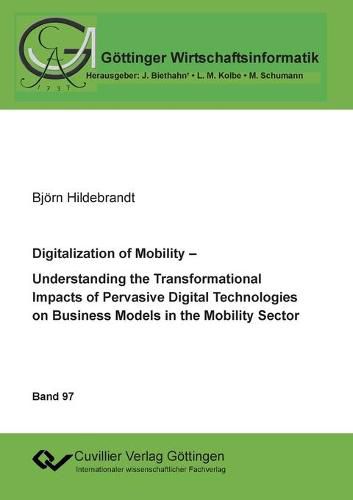Readings Newsletter
Become a Readings Member to make your shopping experience even easier.
Sign in or sign up for free!
You’re not far away from qualifying for FREE standard shipping within Australia
You’ve qualified for FREE standard shipping within Australia
The cart is loading…






The ongoing diffusion of digital technologies heralds a major change in the mobility domain as it helps to unearth significant opportunities for the reorganization of socio-technical arrangements that have existed for decades. In this light, both scholars and practitioners have begun to investigate the novel opportunities and challenges confronting the mobility sector. This cumulative thesis, composed of five individual studies, aspires to provide a comprehensive understanding of the transformational impacts of pervasive digital technologies on business models in the mobility sector. Employing a multi-level perspective, this thesis focuses on three main objectives: (1) shedding light on the nature of digitalization and its impacts on business models in general terms, (2) exploring changes in incumbent mobility firms’ business models in response to the increased diffusion of digital technologies, and (3) examining the potentials of digital technologies to improve value creation and capture in disruptive mobility business models. The findings underline that digitalization is not only concerned with technical aspects but is rather a socio-technical process of applying digital technologies to broader institutional and social contexts. Due to the diversity of technologies and actors involved, digitalization has evolved into an overarching phenomenon that is beyond the control of single actors and affects changes in firms’ business models through diverse mechanisms. In addition, this thesis describes how incumbent mobility firms adapt their business models in light of consumers’ changing preferences and how they source the knowledge necessary to develop innovations that build upon hybrid combinations of physical and digital components. Finally, the thesis elaborates on the capacity of digital technologies to facilitate the rise of disruptive mobility business models by improving their attractiveness for both consumers and providers. The crucial success factor is compati
$9.00 standard shipping within Australia
FREE standard shipping within Australia for orders over $100.00
Express & International shipping calculated at checkout
The ongoing diffusion of digital technologies heralds a major change in the mobility domain as it helps to unearth significant opportunities for the reorganization of socio-technical arrangements that have existed for decades. In this light, both scholars and practitioners have begun to investigate the novel opportunities and challenges confronting the mobility sector. This cumulative thesis, composed of five individual studies, aspires to provide a comprehensive understanding of the transformational impacts of pervasive digital technologies on business models in the mobility sector. Employing a multi-level perspective, this thesis focuses on three main objectives: (1) shedding light on the nature of digitalization and its impacts on business models in general terms, (2) exploring changes in incumbent mobility firms’ business models in response to the increased diffusion of digital technologies, and (3) examining the potentials of digital technologies to improve value creation and capture in disruptive mobility business models. The findings underline that digitalization is not only concerned with technical aspects but is rather a socio-technical process of applying digital technologies to broader institutional and social contexts. Due to the diversity of technologies and actors involved, digitalization has evolved into an overarching phenomenon that is beyond the control of single actors and affects changes in firms’ business models through diverse mechanisms. In addition, this thesis describes how incumbent mobility firms adapt their business models in light of consumers’ changing preferences and how they source the knowledge necessary to develop innovations that build upon hybrid combinations of physical and digital components. Finally, the thesis elaborates on the capacity of digital technologies to facilitate the rise of disruptive mobility business models by improving their attractiveness for both consumers and providers. The crucial success factor is compati